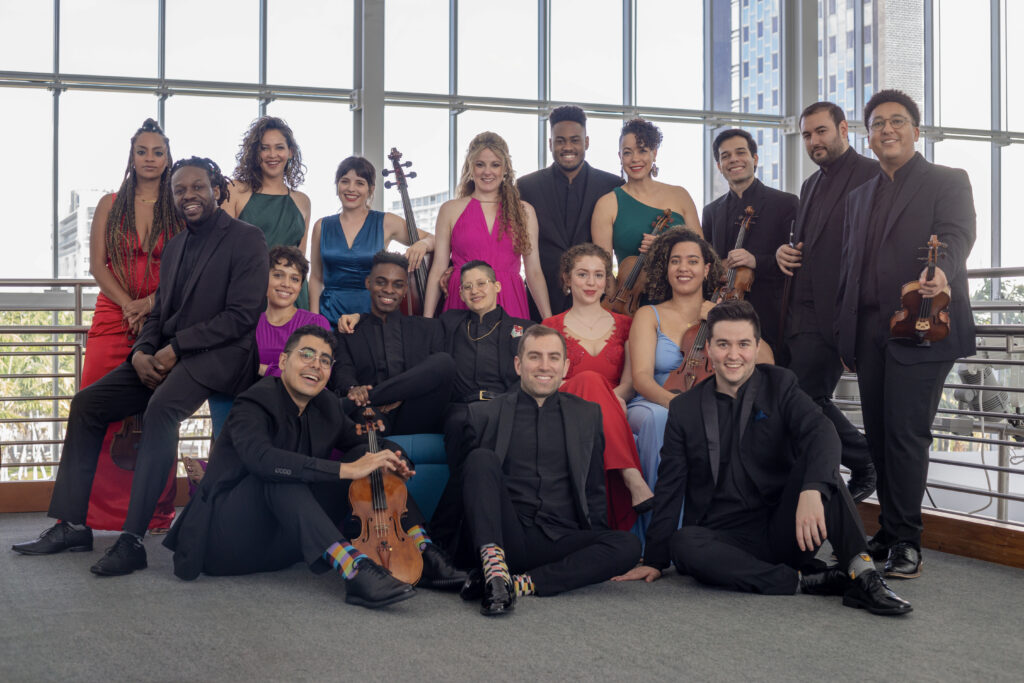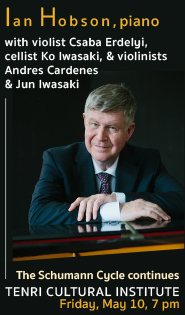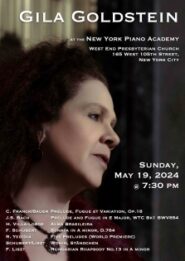Sphinx Virtuosi color outside the lines at Carnegie Hall
The Sphinx has a riddle for you: Why are there so few black and Hispanic-American musicians in symphony orchestras, or elsewhere in classical music?
The answer, says the Detroit-based educational nonprofit Sphinx Organization, is plain enough: racial prejudice, entrenched attitudes, and the lack of a supportive environment for young classical musicians of color.
Many are the stories, for example, of notable black artists who were trained on Bach and Chopin, then steered by society’s expectations into jazz or R & B. Well and good for those genres–but the blues’s gain is your local symphony’s loss. And what about the expectations of the young musician him- or herself?
Over the last quarter century, the Sphinx Organization claims over 100,000 minority musicians reached by its school and mentoring programs. Sphinx Virtuosi, its all-star ensemble of 18 string players that tours the U.S. and abroad, gave a strong account of itself in a program of mostly new compositions Friday night in Carnegie Hall.
A gala dinner awaited some concertgoers after the 7 p.m. program, so these young virtuosi got right to the point with eight brief selections by black or Latin American composers. A near-capacity audience, including many in their teens, enthusiastically cheered the performers.
Habari Gani, a 2023 piece by the 22-year-old cellist-composer Quenton Blache—the title means “What’s up?” in Swahili—was brought to you by the number five, as in the pentatonic scale favored by African music, and also a swinging five-to-a-bar beat. The Sphinx players wove their dancing lines together in a polished, exuberant performance that proved an ideal introduction to the band.
Another brand-new piece by a cellist, Andrea Casarrubios’s Herencia (“Heritage”), was inspired, the composer wrote, not by a particular musical tradition but by the “unique history of unfathomable complexity” each performer and each listener brought to the concert—a Sphinxian message of diversity, if you will.
Still, echoes of Bach chorales and Copland’s wide-open spaces could be heard in the highly expressive, idiomatic writing for strings, and in the novel blend, at one point, of the players’ wordless singing with their silky string tone.
Coleridge-Taylor Perkinson was a major presence in jazz arranging and concert music in the late 20th century. The subtitle of his 1996 Sinfonietta No. 2, “Generations,” referred to his African ancestors, and was adopted by Sphinx as the overall title of Friday’s program.
No doubt for reasons of time, only the piece’s finale, a furiously fugal Allegro vivace, was performed. Although that felt a little like seeing the dénouement without the play, the movement made a fine showcase for ensemble virtuosity with its bluesy tune over blazing cello riffs, its samba-like seven-to-a-bar beat, and pizzicato drumming effects.
Dialing back still further to Heitor Villa-Lobos, soprano Aundi Marie Moore and an ensemble of eight cellos gave a sensitive rendering of that composer’s well-known Aria from Bachianas brasileiras No. 5. The familiar wordless melody emerged pianissimo in a thin thread at first, but blossomed on top as the singer offered glimpses of her gleaming upper register. After intoning the middle section’s poetic text on a taut line, she did her best to project the hummed recapitulation into Carnegie’s voluminous space, but some imagination was needed to make it out.
Twenty-nine-year-old Xavier Foley was both composer and one of the soloists in his Concertante for Two Double Basses and String Orchestra, “Galaxy,” composed earlier this year with a commission from Sphinx Virtuosi, the New World Symphony and Carnegie Hall. The piece’s vision of the double bass, in the composer’s words, “defying expectations and fully exploring the range of possibilities of the instrument,” might be a metaphor for the Sphinx Organization’s mission.
Foley opened the piece with a bold cadenza on his double bass, followed by the second soloist, Kebra Seyoun Charles, with a more lyrical utterance. Then, like siblings, the two players harmonized, squabbled, and competed up and down the fingerboard. The ensemble accompanied them in spacious, one might say galactic, crescendos before settling into a groove driven by one of the group’s violinists wielding a shaker.
The solo basses were discreetly amplified, maybe too discreetly for optimal audibility in the large hall. But the razzle-dazzle of their rapid dialogue, tremolo and string-crossing was not lost on the audience, who cheered after the brilliant coda.
The African subtext of much of the program became vividly explicit in the three closing numbers, composed and performed by the charismatic South African cellist and singer Abel Selaocoe. Resplendent in a flowing orange garment, accompanied by the full Sphinx ensemble and John Hadfield on Western and African percussion, Selaocoe stroked his cello with a reedy, vibratoless African sonority and sang in at least three registers: a sturdy baritone, a piercing falsetto, and a powerful, Tuva-style throat bass with whistling overtones.
The first piece, the chant-like “Ohawe,” was a tribute, the composer wrote, “to a nephew who brought…a lot of wisdom and understanding of what children have to offer.” That would include plenty of raw energy, expressed through marcato strings, booming drums, roaring vocals, and a syncopated, driving riff.
Sphinxian metaphors continued in “Lerato,” a quietly voiced meditation on “finding home in the idea of universality that goes beyond race, beyond color, beyond class…looking for what’s bigger than you in others or in nature.” Selaocoe’s voice and cello imitated each other, slender-toned and gently inflected, as the string accompaniment stole in around them.
The message of the rousing final number, “Ka Bohaleng,” was ostensibly about “the woman being the glue of the family,” but the message of the audience standing and clapping along with the driving beat and the exuberant bark of Selaocoe’s voice was, “Sphinx is cool!”






